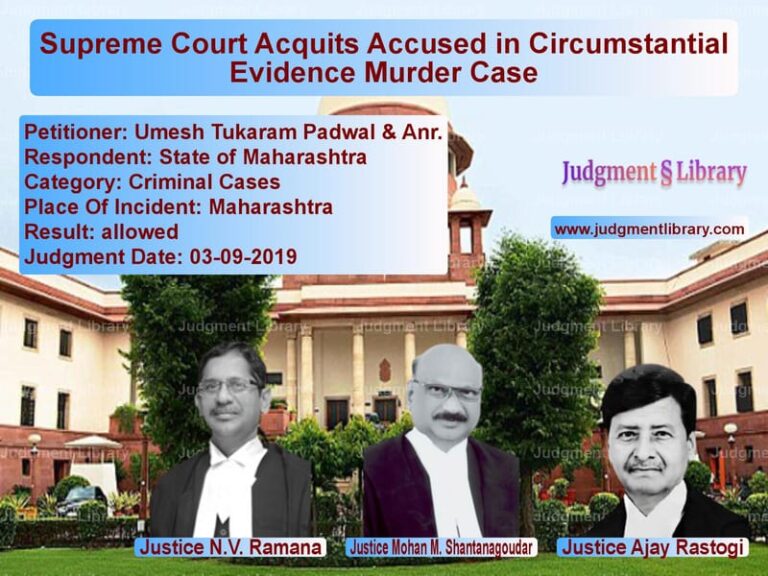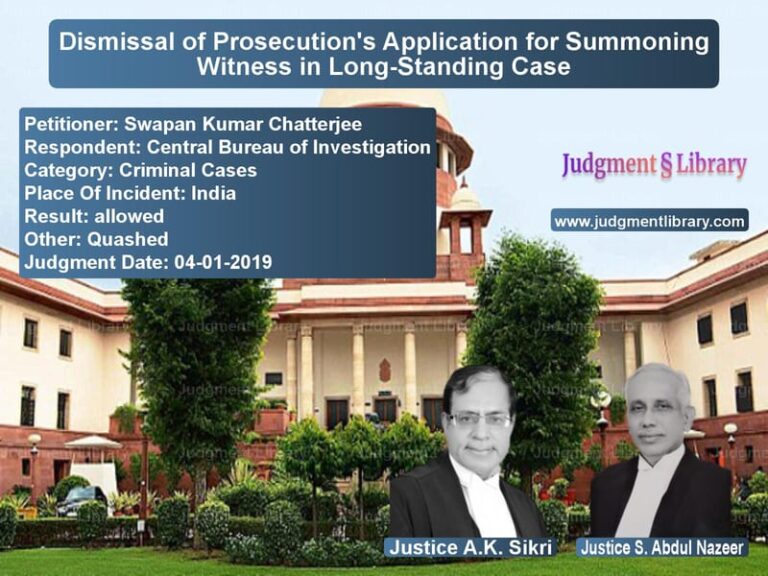Supreme Court’s Verdict on Legality of Compromise Agreement in Property Dispute
The case of Muni Reddy & Anr. v. C. Nagaraju & Ors. presented a crucial legal question regarding the legitimacy of a compromise agreement reached in a property dispute. The appeal before the Supreme Court arose from a judgment of the Karnataka High Court, which dismissed the appellants’ case without adequately considering the validity of the compromise agreement. The Supreme Court was tasked with determining whether the High Court erred in its approach by overlooking the need to verify the authenticity of the agreement before deciding the case on merits.
Background of the Case
The dispute originated from a civil suit (O.S. No. 3/90) filed by the appellants, seeking the cancellation of a sale deed dated 24.08.1989. The trial court dismissed the suit, prompting the appellants to file a first appeal (R.A. No. 18/97), which was also dismissed. Undeterred, the appellants filed a second appeal (R.S.A. No. 804/2001) before the Karnataka High Court.
During the pendency of the second appeal, the parties reportedly reached a compromise. Consequently, the High Court disposed of the appeal on 10.04.2002 in terms of the compromise agreement. However, one of the defendants, C. Nagaraju (respondent No. 1), later contested the agreement’s validity, asserting that it was not binding on him. He filed an application to recall the order based on the compromise.
Chronology of Legal Proceedings
- The High Court dismissed the application challenging the compromise agreement.
- Respondent No. 1 then approached the Supreme Court, which, on 04.08.2003, set aside the High Court’s order and remitted the matter back for fresh consideration.
- Upon remand, the High Court was expected to evaluate the validity of the compromise agreement.
- However, the High Court instead proceeded to decide the second appeal on merits without addressing the issue of whether the compromise was legally valid.
Key Legal Issues
The Supreme Court was called upon to determine:
- Whether the High Court erred in failing to first examine the legitimacy of the compromise agreement before ruling on the appeal.
- Whether the second appeal should have been adjudicated on its merits or disposed of based on the compromise.
Arguments by the Appellants
The appellants contended that:
- The High Court failed to follow the Supreme Court’s directive issued in 2003, which required it to first determine the authenticity of the compromise agreement.
- By bypassing this crucial inquiry, the High Court unfairly decided the appeal on merits.
- The compromise agreement, once validated, would have negated the need for further litigation.
Arguments by the Respondents
Respondent No. 1 (C. Nagaraju) argued that:
- The compromise agreement was not binding on him and should be declared invalid.
- The High Court, in its second ruling, correctly dismissed the appeal on its merits, making the issue of the compromise agreement irrelevant.
- Even if the Supreme Court had remanded the case earlier, the High Court’s decision should stand since it was based on legal grounds.
Supreme Court’s Observations
The Supreme Court took a critical view of the High Court’s handling of the case. The key observations were:
- The High Court misinterpreted the Supreme Court’s 2003 order by failing to verify the compromise agreement first.
- If the compromise agreement was found to be valid, there would have been no need to proceed with the second appeal.
- The High Court’s decision to bypass the issue of the compromise and adjudicate on the appeal’s merits was erroneous.
Key Excerpts from the Judgment
The Supreme Court stated:
“On mere reading of the order dated 03.08.2003, it is clear that this Court remanded the matter to the High Court with a request to decide it afresh in accordance with law, including the question of consideration of the compromise petition. This implied that the question of consideration of the compromise petition was required to be decided first.”
The judgment further clarified:
“If the compromise was held to be legal and proper, there was no need to decide the second appeal on merits. In other words, the need to decide the second appeal on merits would have arisen only if the compromise would have been held illegal and not binding on the parties concerned.”
Supreme Court’s Final Verdict
The Supreme Court allowed the appeal and remanded the case back to the High Court. It directed that:
- The High Court must first determine the authenticity and legality of the compromise agreement.
- If the compromise agreement is found valid, the second appeal will not require further adjudication.
- If the compromise is deemed invalid, only then should the High Court hear the second appeal on merits.
- The High Court must dispose of the matter within six months.
Conclusion
The Supreme Court’s decision underscores the importance of following procedural directives when dealing with disputed agreements. It reaffirmed that lower courts must first assess the validity of a compromise before making further legal determinations. The ruling provides clear guidance on how courts should handle cases involving contested compromise agreements in property disputes, ensuring that no party is unfairly prejudiced due to procedural lapses.
Petitioner Name: Muni Reddy & Anr..Respondent Name: C. Nagaraju & Ors..Judgment By: Justice Abhay Manohar Sapre, Justice S. Abdul Nazeer.Place Of Incident: Bangalore, Karnataka.Judgment Date: 20-09-2018.
Don’t miss out on the full details! Download the complete judgment in PDF format below and gain valuable insights instantly!
Download Judgment: Muni Reddy & Anr. vs C. Nagaraju & Ors. Supreme Court of India Judgment Dated 20-09-2018.pdf
Direct Downlaod Judgment: Direct downlaod this Judgment
See all petitions in Contract Disputes
See all petitions in Specific Performance
See all petitions in Damages and Compensation
See all petitions in Judgment by Abhay Manohar Sapre
See all petitions in Judgment by S. Abdul Nazeer
See all petitions in allowed
See all petitions in Remanded
See all petitions in supreme court of India judgments September 2018
See all petitions in 2018 judgments
See all posts in Civil Cases Category
See all allowed petitions in Civil Cases Category
See all Dismissed petitions in Civil Cases Category
See all partially allowed petitions in Civil Cases Category







